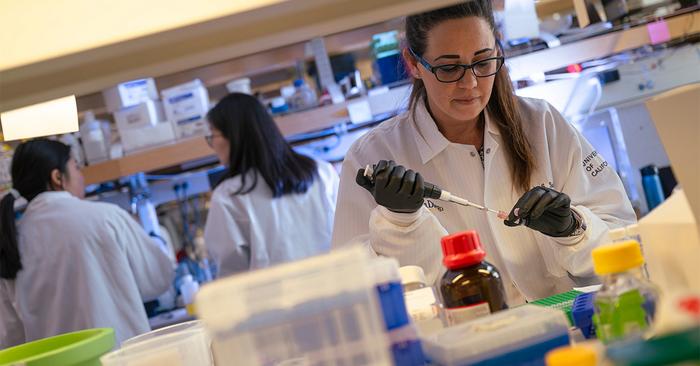Scientists at UC San Diego have developed a machine learning algorithm to simulate the time-consuming chemistry involved in the earliest phases of drug discovery, which could significantly streamline the process and open doors for never-before-seen treatments. Identifying candidate drugs for further optimization typically involves thousands of individual experiments, but the new artificial intelligence (AI) platform could potentially give the same results in a fraction of the time. The researchers used the new tool, described in Nature Communications, to synthesize 32 new drug candidates for cancer.

Credit: Erik Jepsen/UC San Diego
Scientists at UC San Diego have developed a machine learning algorithm to simulate the time-consuming chemistry involved in the earliest phases of drug discovery, which could significantly streamline the process and open doors for never-before-seen treatments. Identifying candidate drugs for further optimization typically involves thousands of individual experiments, but the new artificial intelligence (AI) platform could potentially give the same results in a fraction of the time. The researchers used the new tool, described in Nature Communications, to synthesize 32 new drug candidates for cancer.
The technology is part of a new but growing trend in pharmaceutical science of using AI to improve drug discovery and development.
“A few years ago, AI was a dirty word in the pharmaceutical industry, but now the trend is definitely the opposite, with biotech startups finding it difficult to raise funds without addressing AI in their business plan,” said senior author Trey Ideker, professor in the Department of Medicine at UC San Diego School of Medicine and adjunct professor of bioengineering and computer science at the UC San Diego Jacobs School of Engineering. “AI-guided drug discovery has become a very active area in industry, but unlike the methods being developed in companies, we’re making our technology open source and accessible to anybody who wants to use it.”
The new platform, called POLYGON, is unique among AI tools for drug discovery in that it can identify molecules with multiple targets, while existing drug discovery protocols currently prioritize single target therapies. Multi-target drugs are of major interest to doctors and scientists because of their potential to deliver the same benefits as combination therapy, in which several different drugs are used together to treat cancer, but with fewer side effects.
“It takes many years and millions of dollars to find and develop a new drug, especially if we’re talking about one with multiple targets.” said Ideker. “The rare few multi-target drugs we do have were discovered largely by chance, but this new technology could help take chance out of the equation and kickstart a new generation of precision medicine.”
The researchers trained POLYGON on a database of over a million known bioactive molecules containing detailed information about their chemical properties and known interactions with protein targets. By learning from patterns found in the database, POLYGON is able to generate original chemical formulas for new candidate drugs that are likely to have certain properties, such as the ability to inhibit specific proteins.
“Just like AI is now very good at generating original drawings and pictures, such as creating pictures of human faces based off desired properties like age or sex, POLYGON is able to generate original molecular compounds based off of desired chemical properties,” said Ideker. “In this case, instead of telling the AI how old we want our face to look, we’re telling it how we want our future drug to interact with disease proteins.”
To put POLYGON to the test, the researchers used it to generate hundreds of candidate drugs that target various pairs of cancer-related proteins. Of these, the researchers synthesized 32 molecules that had the strongest predicted interactions with the MEK1 and mTOR proteins, a pair of cellular signaling proteins that are a promising target for cancer combination therapy. These two proteins are what scientists call synthetically lethal, which means that inhibiting both together is enough to kill cancer cells even if inhibiting one alone is not.
The researchers found that the drugs they synthesized had significant activity against MEK1 and mTOR, but had few off-target reactions with other proteins. This suggests that one or more of the drugs identified by POLYGON could be able to target both proteins as a cancer treatment, providing a list of choices for fine-tuning by human chemists.
“Once you have the candidate drugs, you still need to do all the other chemistry it takes to refine those options into a single, effective treatment,” said Ideker. “We can’t and shouldn’t try to eliminate human expertise from the drug discovery pipeline, but what we can do is shorten a few steps of the process.”
Despite this caution, the researchers are optimistic that the possibilities of AI for drug discovery are only just being explored.
“Seeing how this concept plays out over the next decade, both in academia and in the private sector, is going to be very exciting.” said Ideker. “The possibilities are virtually endless.”
Full link to study: https://www.nature.com/articles/41467-024-47120-y
Co-authors of the study include: Brenton Munson, Michael Chen, Audrey Bogosian, Jason Kreisberg, Katherine Licon, Abagyan Ruben and Brent Kuenzi, all at UC San Diego.
This study was funded, in part, by the National Institutes of Health (Grants CA274502, GM103504, ES014811, CA243885, CA212456).
# # #
Journal
Nature Communications
COI Statement
Trey Ideker is a scientific co-founder, consultant, and advisory board member with equity and income with Data4Cure, Inc, Ideaya Biosciences, Inc., Serinus Biosciences Inc., and Jengu Therapeutics, Inc.




